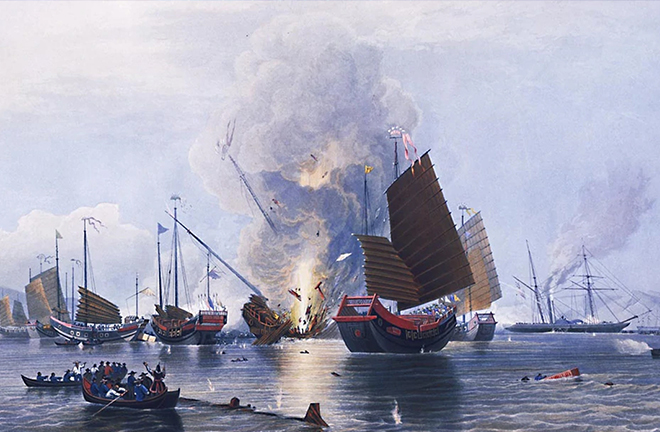‘Global South’ offers analysis tool

FILE PHOTO: After the First Opium War in the 1840s, China began to be reduced to a semi-colonial and semi-feudal society, which ended with the PRC’s founding in 1949.
In both academic research and international politics, the ‘Global South’ is a very common concept. It usually refers to low and middle-income countries, most of which are in the southern hemisphere. The ‘Global North,’ on the contrary, refers to high-income countries mostly within the northern hemisphere.
Multiple connotations
According to Sebastian Haug, a researcher in the ‘Inter- and Transnational Cooperation’ research program at the German Development Institute (DIE), ‘South’-related terminology in social science literature has mostly been used as a general rubric for the decolonized nations located largely south of former colonial centers. The ‘Global South’ often appears in discussions of the continuing reverberations of colonialism and imperialism, systemic inequalities stemming from colonial histories, and the potential for alternative sources of power and knowledge.
The qualifier ‘Global’ as an add-on to the ‘South’ carries two connotations, Haug continued. First, it underlines the increasing interconnectedness of social relations that place questions about ‘North’ and ‘South,’ rich and poor, in a globalized context. Second, it marks a shift from a central focus on economic development or cultural differences towards an emphasis on geopolitical relations of power.
Anne Garland Mahler, director of the Global South Studies Project at the University of Virginia, noted that the concept of the ‘Global South’ is mainly used in three ways. In international organizations, the ‘Global South’ is often used to refer to countries in Africa, Asia, and Latin America. This nation-based understanding of the ‘Global South’ is an appropriation of a concept that has deeper roots in Cold War political thought. In academic and activist circles, the term is used in a more geographically fluid way, referring to spaces and peoples that are negatively impacted by contemporary capitalist globalization. In other words, there are economic ‘Souths’ in the geographic North and ‘Norths’ in the geographic South. Through this geographically fluid definition, a third meaning is attributed to the ‘Global South’ where it refers to a global political community that recognizes one another and views their conditions as shared.
Analysis tool
As there are multiple understandings of the ‘Global South,’ is it too general and equivocal as a term for scholarly work? In Mahler’s opinion, whenever we try to find a word or concept to describe how vastly different groups of people share similar conditions of exploitation, we run into trouble. All such words or concepts have their limitations. The ‘Global South’ is just one in a series of concepts that has been used to describe a transnational “political imaginary” and a global resistant collectivity that arises from a shared experience of the negative effects of capitalist globalization.
The ‘Global South’ as a political notion emerges from the history of global justice movements, and particularly, a Cold War movement called the Tricontinental, said Mahler. The Tricontinental Conference was held in Cuba in January 1966 and was attended by roughly 500 delegates from 82 countries in Africa, Asia, and Latin America. It founded the Organization of Solidarity of the Peoples of Africa, Asia, and Latin America (OSPAAAL). The Tricontinental movement often used the term ‘South’ to refer to spaces of oppression around the globe and framed its critique of global capitalism through focusing on racial violence and racial inequality.
The expanding popularity of the notion of the ‘Global South’ since the 1990s, and especially over the last 15 years, has been in tandem with the rise of a new era of social activism, and particularly of solidarity politics. The 2008 financial crisis and the subsequent Great Recession provoked a backlash against neoliberal economics around the world and sparked protests in several regions. Mahler considers the ‘Global South’ an attempt to name these transnationally networked political movements and to understand their multiple histories.
In academia, the ‘Global South’ has become a popular device for framing research. Haug and Jacqueline A. Braveboy-Wagner, a professor of politics at the City College of New York, among other scholars, used the abstract and citation database Scopus as a proxy for mapping the evolution of this trend in peer-reviewed Anglophone publications from 1994 to 2020. They found the number of publications mentioning the ‘Global South’ in titles, abstracts, and keywords have increased from one to more than 1,600 over the 27 years. This boom has been a general one across thematic areas and disciplines.
However, most publications containing references to the ‘Global South’ take the category as a given, without explicitly defining what the ‘Global South’ represents or to what extent it actually adds to their discussion. There has been a tendency to frame all kinds of empirical research on spaces referred to as ‘Third World,’ ‘developing world,’ or ‘non-Western’ as ‘research on the Global South,’ while a systematic examination of actual links across sites is often missing.
The ‘Global South’ can mean different things to different people, and different subfields of academic inquiry might have different implicit understandings of what the ‘Global South’ is supposed to stand for, Haug remarked.
Acknowledging the evolving and heterogeneous nature of this category is potentially fruitful. Haug, Braveboy-Wagner, and others suggest treating the ‘Global South’ as a meta-category to investigate multilateral power structures, to analyze organizational processes, and to examine in a variety of ways macro-dynamics that continue to shape different segments of world politics.
Edited by YANG LANLAN

 PRINT
PRINT CLOSE
CLOSE